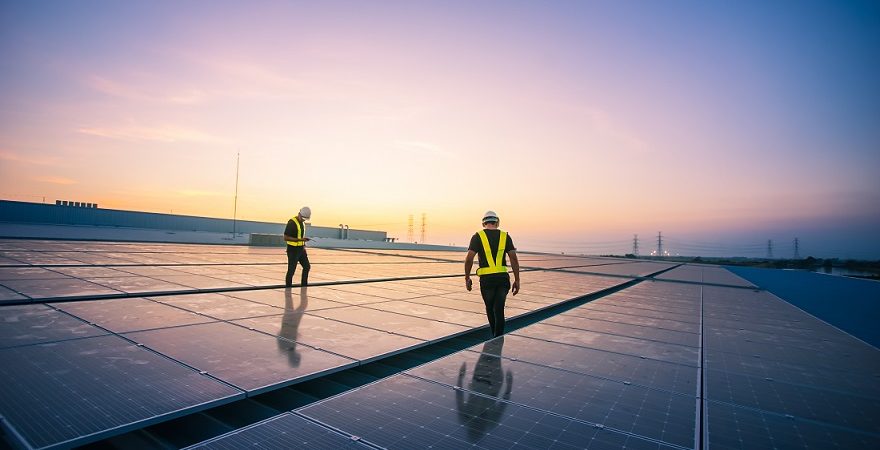Brazilian fiberglass manufacturing company, GM Fibras, has partnered with WNI Smart Energy to install a 75 kWp photovoltaic solar energy system on the roof of its factory, generating 100 MWh per year and avoiding the emission of approximately 12.5 tons of CO2 yearly.
Photovoltaic solar energy is the second largest source of Brazil’s power grid, reaching 23.9 gigawatts (GW) of operational installed capacity, surpassing wind power with 23.8 GW, according to a survey by the Brazilian Association of Photovoltaic Solar Energy (Absolar).
The importance of solar energy for the country – 11.2% of the grid, now ranking second only to hydropower, with 51.3% – occurs amidst a significant growth in the wake of economic incentives for the installation of small to large photovoltaic plants, given the lower costs of the source and its environmental benefits.
Last year, installed solar energy capacity in the country grew more than 60%, and in recent months, the growth rate has been nearly 1 GW per month.
It was expected for the energy supply model, which remained in continuous growth since 2012 when consumers could generate their own energy. Thus, WNI Smart Energy has announced the activation of GM Fibras’ first solar plant: The Photovoltaic Generating Center (UFV) GM Fibras, located in the city of São José dos Pinhais, in the metropolitan region of Curitiba, Brazil.
The UFV GM Fibra, which began operations in July 2022, has completed nine months of operation and can generate 100 MWh per year, which would be sufficient to power a neighborhood with 658 households. The UFV is composed of 142 modules of 530 Wp, occupying an area of 450 m².
According to Ludfor’s environmental compensation calculation, the plant will avoid the emission of approximately 12.5 tons of CO2 yearly, equivalent to 1264 preserved tree seedlings for 25 years.
In the first six months of plant operation, the accumulated generation was 58,993 kWh, which has already generated a saving of almost R$50,000. GM Fibras expects to obtain the whole return on investment within 3.5 years (considering the value of R$ 0.80 per kWh).
WNI Smart Energy, which already serves more than 100 customers in the Southern, Southeastern, Central-Western and Northeastern regions, was the partner company responsible for providing the structure and putting the photovoltaic plant into operation, located on the roof of the entire factory and which will be the largest plant among companies in the fiberglass manufacturing sector in Paraná. The company is already building another 15 solar power plants.
Nóbile Scandelari Jr, CEO, WNI, said: “We are transforming GM Fibras into a more eco-efficient company. We have installed a 75 kWp photovoltaic solar energy system to supply the entire factory’s energy consumption. This system has 142 solar panels that generate a lot of energy for the company, and with this, we are building a more sustainable future. We are a reference in solar energy in the state, and we hope to double the growth in 2023.”
WNI Smart Energy is part of the WNI Technology Group, which has more than 20 years of experience in telecommunications, with fiber optic and radio networks, security systems and software solutions for the IT area, professional lighting solutions for the public market, and is one of the pioneers in Paraná’s market developing electricity projects to encourage the development of renewable energies.
The company invests in providing a complete service carried out by an experienced technical and commercial team, besides having strategic partnerships with a select group of established companies in the market to ensure meeting the specific demands of each client.
GM Fibras is one of the largest companies in the leisure segment in the south of the country. With almost 20 years of experience in the market, it develops high-quality and cutting-edge technology products.
Specialized in the industrialization of fiberglass artifacts, such as pools and accessories, water slides, spas, whirlpools and water tanks, it has a modern factory, high-quality raw materials, advanced manufacturing techniques and highly specialized personnel. The company already serves the states of Paraná, Santa Catarina, Rio Grande do Sul and São Paulo and is preparing to export to Mercosur countries.
The industrialization of the products allows for agility in the manufacturing process, quick delivery and product quality assurance.
GM Fibras has acquired state-of-the-art machinery and adopted cutting-edge processes for fiberglass products.
According to João Carlos Miranda, CEO, GM Fibras, the goal of every entrepreneur is to save as much as possible on fixed monthly expenses to invest more in their own business. “We know that high energy consumption in factories makes solar energy for industries increasingly important,” he said.
“This renewable source, in addition to substantially reducing costs with electricity bills, significantly reduces environmental impact which directly influences the operation and maintenance of factories when it comes to saving.”




